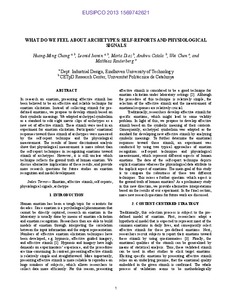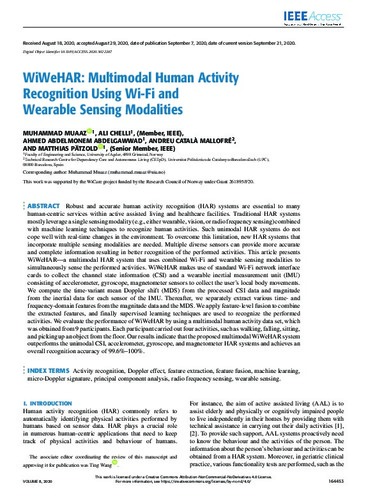Exploració per autor "Català Mallofré, Andreu"

Ara es mostren els items 74-77 de 77
-
What do we feel about archetypes: self-reports and physiological signals

Huang-Ming, Chang; Ivonin, Leonid; Díaz Boladeras, Marta; Català Mallofré, Andreu; Chen, Wei; Rauterberg, Mattias (Institute of Electrical and Electronics Engineers (IEEE), 2013)
Huang-Ming, Chang; Ivonin, Leonid; Díaz Boladeras, Marta; Català Mallofré, Andreu; Chen, Wei; Rauterberg, Mattias (Institute of Electrical and Electronics Engineers (IEEE), 2013)
Comunicació de congrés
Accés obertIn research on emotion, presenting affective stimuli has been believed to be an effective and reliable technique for emotion elicitation. Instead of collecting stimuli for pre-defined emotions, we propose to develop stimuli ... -
What do we feel about archetypes: self-reports and physiological signals

Chang, Huang-Ming; Ivonin, Leonid; Díaz Boladeras, Marta; Català Mallofré, Andreu; Chen, Wei; Rauterberg, Mattias (2013)
Chang, Huang-Ming; Ivonin, Leonid; Díaz Boladeras, Marta; Català Mallofré, Andreu; Chen, Wei; Rauterberg, Mattias (2013)
Comunicació de congrés
Accés obertIn research on emotion, presenting affective stimuli has been believed to be an effective and reliable technique for emotion elicitation. Instead of collecting stimuli for predefined emotions, we propose to develop stimuli ... -
Who is a Better Tutor? Gaze Hints with a Human or Humanoid Tutor in Game Play

Mwangi, Eunice; Barakova, Emilia; Díaz Boladeras, Marta; Català Mallofré, Andreu; Rauterberg, Mattias (2017)
Mwangi, Eunice; Barakova, Emilia; Díaz Boladeras, Marta; Català Mallofré, Andreu; Rauterberg, Mattias (2017)
Comunicació de congrés
Accés obertIn this paper, we present a study that analyses the effects of robot or human gaze hints on people's choices in a card game. We asked human participants to play a matching card game in the presence of a human or a robotic ... -
WiWeHAR: multimodal human activity recognition using Wi-Fi and wearable sensing modalities

Muaaz, Muhammad; Chelli, Ali; Abdelgawwad, Ahmed Abdelmonem; Català Mallofré, Andreu; Pätzold, Matthias (Institute of Electrical and Electronics Engineers (IEEE), 2020-09-21)
Muaaz, Muhammad; Chelli, Ali; Abdelgawwad, Ahmed Abdelmonem; Català Mallofré, Andreu; Pätzold, Matthias (Institute of Electrical and Electronics Engineers (IEEE), 2020-09-21)
Article
Accés obertRobust and accurate human activity recognition (HAR) systems are essential to many human-centric services within active assisted living and healthcare facilities. Traditional HAR systems mostly leverage a single sensing ...





